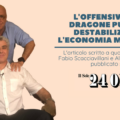Xi Jinping was chosen to lead China because he is considered the most adept at finding a compromise between the country’s traditional strategic goals and the interests of the Nomenklatura that nominated him. But the inheritance he received from his predecessor is anything but simple. In fact, despite exiting the financial crisis, limits and contradictions within the Chinese model have emerged with force, especially regarding the sustainability of its prestigious economic development and the simultaneous accentuation of inequalities. International tensions, especially with neighboring countries, demonstrate how China, despite being an economic powerhouse—now dependent on economic cycles, however—still cannot fully consider itself integrated into the dimension of global politics.
In the fall of 2012, Xi Jinping was given a titanic ship with the assignment of navigating it toward new and secure harbors. He’ll have to keep the ship’s dimensions in mind, but especially the expanse of water he needs to navigate. This will decide if he goes down in history as a boatswain or the successor of a glorious Great Helmsman. Xi had been Hu Jintao’s designated heir since 2007, but he only received official investiture at the XVIII Congress. As predicted, he will need to be reelected for another mandate in 2017 and complete the canonical ten years in power. Representative of the “fifth generation” of leaders, the secretary general has an impeccable pedigree. He’s the son of another party representative persecuted during the Cultural Revolution, in which Xi participated enthusiastically when he was young. He has an excellent academic curriculum; like all leaders, he’s an engineer, but he also specialized in philosophy to reach the party’s maximum ideological and propagandist responsibilities. He played numerous roles within the organization, both administrative and political. He’s recognized as honest, competent, dedicated, shrewd, and rigorous. These qualities are evaluated with the Chinese prism; they would obviously assume other names if the point of view were changed. In any case, he’s considered a person inclined to dialogue, sensitive to transformation, and interested in evolution. Therefore, he appears distant from the grey machine that emerged from the Soviet experience, also emulated with specific traits by China.
His nomination aroused reformist hopes and his first two years confirmed his determination. In any case, it would be misleading to associate his background with expectations. His willingness to renovate is not confirmed by researching his past positions and declarations captured in the media. Xi is sufficiently astute to be capable of using his career for any eventuality. There are two principle causes of his possible eclecticism: China’s objective needs and the way he was nominated. The country—in this case the political organization that manages it—chooses the person most adept at protecting its interests. Strategic interests are unchanged and travel in pairs: maintaining power and ensuring China’s prosperity, consensus, nationalism, growth, and stability. Xi needs to decline the tactics for achieving these fundamental objectives. It seems like a less onerous journey compared to the dramas of the PRC’s epochal decisions; in reality, the obstacles are numerous and insidious. The fact that shortcuts based on force don’t exist at the moment doesn’t mean that political management is efficient or less demanding. Therefore, the leader must move along a vast but stable path. There don’t seem to be any historic Maoist breaks on the horizon like the Great Leap Forward, the Cultural Revolution, or Deng Xiaoping’s 180-degree turns to counteract their effects. Xi’s ascent derived from a collegial choice. His party decided that he was the best leader to follow along an established course. Behind the human façade, behind the commemorative liturgy, they found a synthesis of different viewpoints, the personal and political interests that the components of the Political Office incarnate. China needs unity, concord, and regularity as if its development belonged to the natural order of things and its emergence in the international arena was a fateful return to the past.
In this way the General Secretary has found himself in an objectively weak position because he needs time to free himself from the legacies and people he owes his election to. He needs authority to progress his vision and his task. Hu, Xi’s predecessor, delivered him a strong country but with an uncertain future, feared but not admired, skilled in producing wealth but not overcoming contradictions. In particular, he didn’t resolve the Chinese model’s structural problems; he simply deferred them successfully, trusting in the GDP’s miraculous virtues, whose unstoppable growth seemed to soothe every wound. In effect, Beijing’s recovery from the crisis was swift and relatively painless. GDP growth was always sustained, unemployment subsided, and social protests confined to media episodes. In any case, the limits of the Chinese model have emerged with vigor, based on the incessant cycle of accumulation, investment, and export. Modern China has demonstrated its dependence on foreign countries: it makes no economic sense to be the “factory of the world” if global demand declines under the weight of the crisis. The interminable decline in wages and consumption has strengthened China, rendering it dependent on the international cycle at the same time. It should substitute internal demand for international, passing from investment-led growth to domestic-led growth. This task wasn’t and isn’t easy because it has been deferred too many times. Beijing’s association with multinationals incited its citizens to save and exercise discipline.
In 2009, the government decided on a massive Keynesian-style investment to reinvigorate internal demand. The results were satisfying, even with strong grey areas. Resources were channeled toward mature, labor-intensive sectors with easy guaranteed profits because they weren’t exposed to competition. Builders, territorial lobbyists, state agencies, and manufacturing enterprises reaped the benefits. A socio-political group affirmed itself and capitalized on quantitative growth, the attraction of multinationals, and China as the “World’s Factory.” Infrastructure and real estate construction increased even more while protected companies didn’t distribute dividends, accepting state transfers by virtue of opaque financial channels. Therefore, the recovery took place, but structural problems were not solved. One of Xi’s first interventions struck the “obsession with growth.” He didn’t nominate his successor—neither could he have—but he demonstrated that he knew his country’s limits well. At what price, and for how long, can China still aim for double-digit GDP growth? What is the point of setting new records in the production of steel, cement, shoes, and clothing? It’s more opportune to increase wages, discouraging investments in labor-intensive sectors and promoting consumption. The social disparities must also be reduced, because China is one of the most unequal countries where distribution of wealth according to the Gini coefficient is greater that in the US.
In fact, despite the preceding government’s diffusion of the buzzword “harmonious society,” the country shows worrisome cracks for public order and stability. The internal situation is still under control, but protests against requisitions, the arrogance of public officials, the Nomenklatura’s privileges, the lifestyles of the rich and powerful, and the difficulty making end’s meat are increasing. Today China is a statistically wealthier nation, but at the same time it can’t contain the heaps of poverty, as if the dreams it projects aren’t reachable. The housing bubble prohibits home purchases at reasonable values, nullifying years of saving. The banks concede little credit to businesses, fueling illegal shadow banking and neglecting the repression of privileged paths for those who boast untouchable connections. Dissent is tolerated in its initial forms. Its organization is still prohibited and repressed, while restrictions on information have become more raw and diffuse. The internationalization of the renminbi, the cornerstone of China’s opening to financial markets, is proceeding viscously. The currency is increasingly accepted, in a context subjected to China’s force rather than trust. The dominion of the dollar and other currencies’ over international markets has remained essentially uncontested. To gain trust, the renminbi should be inserted into the liberalization of capital markets, a step that Beijing doesn’t and can’t take. On one hand, China doesn’t intend to lose control over its currency, the umpteenth demonstration of economic nationalism that guides the country. On the other, it has a real fear of uncontrolled exposure in international markets, a risk that the fragile renminbi is discouraged from taking. Tensions in China’s southwest—Tibet and especially Xinjiang—are not composed and have taken a form that will be difficult to absorb. The Turkic and Muslim population—at this point a numerical minority—found ways of fighting with terrorist attacks to which Beijing responds without hesitation. The territory is too important—for its size and resources—to make concessions. Far from being pacified, it represents the most destabilizing hotbed for internal politics.
On the international aspect, Hu’s legacy created a decidedly stronger and unassailable China, but it’s paradoxically more fragile and still poorly embedded in multilateral circuits. Its independence from international economic cycles was clearly established; furthermore, its emergence seemed to provoke more fear than alliances. Obama centered his foreign and military policy on the Pacific because the game of future assets will be played between these two shores. China’s expansion has ignited a series of reactions, all of which are rife with dangers. The territorial disputes over a handful of islands are the symbol of unmasked tensions and unhealed wounds. Even in this light the country seems unassailable, but the enmity with Japan, the Philippines, and Vietnam has reached dangerous levels while the preoccupation with Southeast Asia is palpable; their only alternative is to seek the US’ help. The greatest successes were recorded between two old enemies: South Korea and Taiwan, whose relationship over the past 60 years has not been very close. In any case, the protection of Damocles’ sword over Pyongyang and the respect for democratic diversity casts a shadow, like the latest repressions in Hong Kong demonstrate. Therefore, the China Xi has found himself managing presents objective limits: it’s strong but still not a global power; its achievements are recognized but not imitated; it engenders respect but is not taken as an example. Time has toughened it, but the country has only deferred solutions to its problems. Xi and his great electors know that reforming the system is vital. It doesn’t represent a divine inspiration toward democracy—as is frequently naïvely believed—but a necessity for survival. In fact, Beijing finds itself in the most uncomfortable situation according to Confucian and Leninist teachings: it put a mechanism in motion that it can’t control. In any case, following a path of reforms could still produce the same effects. The contradictions could prove irresolvable, the country could fall into instability, and the CPC would be forced to cede the reigns with uncertain results. It’s the “Gorbachev scenario” most feared by Chinese administrators. They need to calibrate a complex and dangerous operation, where openings are alternated with rigidity. A sequential policy seems to prevail: first strengthen the leadership, and then proceed toward change. The strong man in China has a more positive connotation than he does in the West. If he is entrusted with the country’s destiny, he must appear resolute and capable of creating unity. The shows of force in foreign policy are thus explained, the official repudiation of western values, the intransigence over principles in question, and the country’s still marginal role in international dimensions. The message is clear and simple; it derives from the power of nationalism. On the domestic front, the consolidating detects an unusual difficulty, up to the memory of purges against adverse factions. After Bo Xilai and Zhou Yongkang were defeated—the most powerful victims in the CPC hierarchy since the 70s—the fight against corruption that’s exterminating the organization’s management has deepened amid arrests, lawsuits, removals, and suicides. Contemporaneously, they suffer censure and the ax on technology or the one to intimidate critics. Reforming the political system is obviously not on the agenda, and official positions that Western parliamentarism and constitutionalism are incompatible with China persist.
After consolidation, China might proceed with innovation. Only a cohesive party will be capable of imposing reforms that will inevitably undermine consolidated interests. The battle against corruption and the affirmation of the rule of law in general will not be painless. The “market’s decisive role” promoted by Beijing will find resistance. Paradoxically, market rules will be affirmed administratively by government impositions. The country is slowly exiting its exceptionality; if China protected it before, it is now suffering it as a burden. Xi has a difficult task because he’s not protected from the sacredness of the ideology he needs to defend; he is instead called to pragmatic, ineluctable, and conflicting choices. Time is no longer inexhaustible but a precious resource to manage. The knots are complex and the best leader possible was chosen to untangle them before they need to be cut.
Originally published in Italian on italianieuropei.it on 3/17/15

















